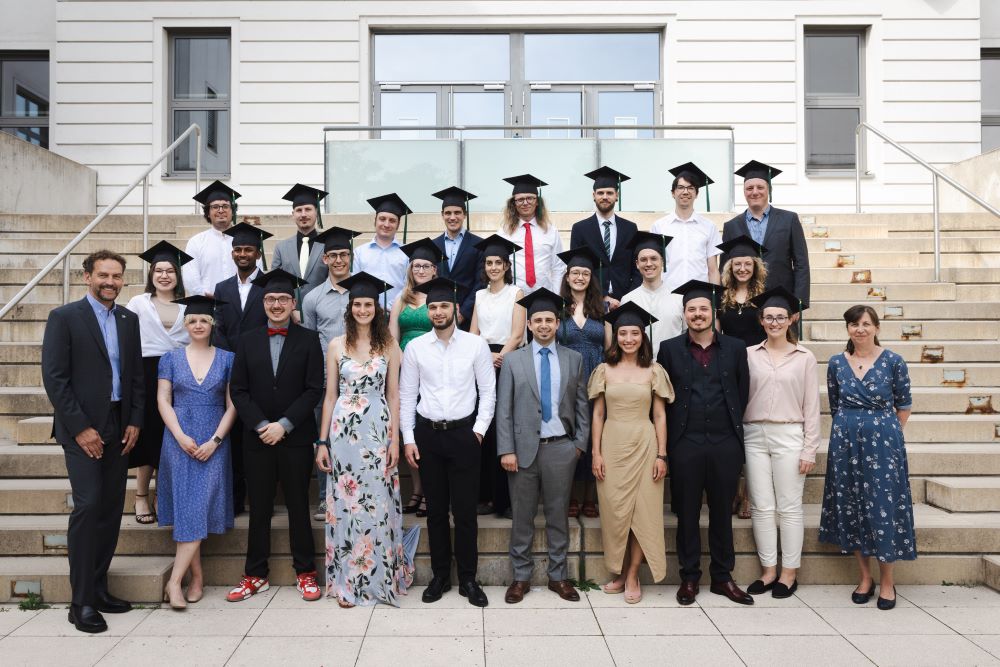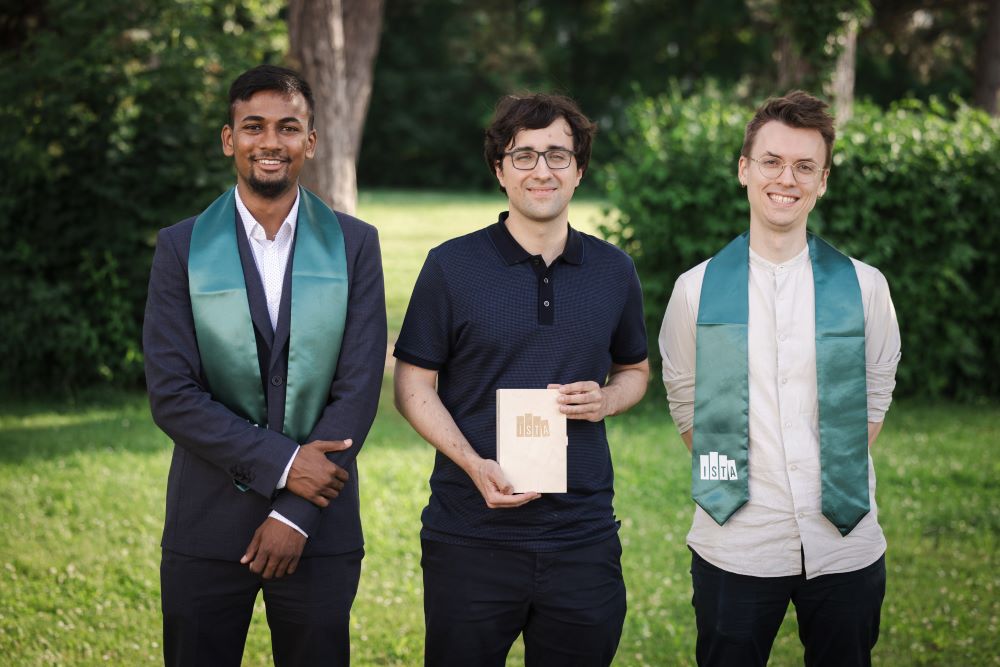June 23, 2023
27 PhD Graduates & 3 Awards at ISTA
Graduates from nine countries. Winners from Austria, India & Russia
Made it! 27 PhD Graduates and two MSc Graduates from nine countries celebrated their degrees at the Institute of Science and Technology Austria (ISTA) this Thursday. Rishabh Sahu from Kanpur, India, and Morris Brooks from Klosterneuburg, Austria, received the ISTA Outstanding PhD Award 2023. The ISTA Alumni Award 2023 went to computer scientist Alexander Kolesnikov from Moscow, Russia, now working at Google Research in Zurich, Switzerland.

The Graduation ceremony was opened by ISTA President Martin Hetzer. “Nothing portrays the scientific range, the curiosity-driven approach, and the outstanding quality of ISTA better than the 29 bright minds that celebrate their graduation today,” he stated. Eva Benková, Dean of the Graduate School, asked the graduates to reflect on their PhD years, the great times and the difficult ones: “I invite you to cherish those memories and the lessons you have learned. Dream big, find resolve in your own abilities, but—most importantly—keep your eyes and minds open for collaboration and inspiration, as you’ll never know when they may strike.”
The graduation ceremony was also honored by a keynote of Jan Konvalinka, Director of the Institute of Organic Chemistry and Biochemistry of the Czech Academy of Sciences (IOCB Prague). In his inspirational speech, he underlined among other things the importance of free and independent research, and the impact of science on society.
Outstanding PhD Awards
Award winner Rishabh Sahu looks back at his earliest days at the Institute with great respect, “I was very overwhelmed when I first came to ISTA with how good at their jobs and knowledgeable everyone was. I would have been happy to just make a meaningful contribution, let alone win an award.” His contribution to the Fink research group focusing on quantum devices was indeed not only meaningful, but indeed extraordinary. He was already co-authoring impactful publications in his second year at ISTA. The culmination of his PhD was the very first entangling of a microwave photon with an optical photon, that in itself is already a fundamental finding, but might also be laying the foundations for a possible future network of quantum computers. This breakthrough was published with Sahu as first author in the magazine Science earlier this year.
His supervisor, Johannes Fink, praised Sahu highly, “Rishabh achieved great things during his PhD. His results represent the state of the art in quantum interconnects worldwide. Also, the talks he recently gave were excellent.” Sahu himself also attributes personal growth and gaining skills such as becoming a better public speaker to his time at ISTA, “I not only learned new science but also new things about myself. Turns out I am more extroverted than I thought and I quite enjoy the social aspects of my job.” He plans to find a job in industry to combine his academic excellence and problem solving skills with what he calls his “new-found social skills”.
From Near and Far
While Sahu’s home town of Kanpur lies about 6000 kilometers from ISTA, the second winner of the Outstanding PhD Award, Morris Brooks, hails from a place much closer: Weidling, a part of the municipality of Klosterneuburg. When Brooks is looking back at his time at ISTA, he can actually go way further back than his first days as a PhD student on the green campus: “When I was a student at the High School Klosterneuburg, I played the guitar in the school’s Mini Big Band. We once performed at the opening ceremony of a new ISTA building. This was around 2010. At that time, graduating from such a prestigious institute seemed like a far-fetched idea.”
By now, Brooks has for sure proven his academic excellence. During his time at the Seiringer group, he studied quantum systems involving large numbers of particles and their collective behavior. In 2021, he was the lead author on a paper on a new way of creating anyons, strange quasi particles, using rotating molecules, possibly aiding efforts to constructing a new kind of quantum computer. His PhD work has been extensive, so far that his supervisor Robert Seiringer underlined that “Morris has solved several major open problems that in total would have been sufficient for three separate PhD theses.”
Brooks himself pointed out that his body of research benefited strongly from the interdisciplinary approach of the Institute, “Especially seeing my work from the view point of physics did not only enhance my understanding of physics itself, but ultimately made me a better mathematician as well.” He plans to stay in academia, currently working as a Postdoc at the University of Zurich to further develop the techniques he has learned during his doctoral studies.

From ISTA to Google Research
What the future can hold for excellent PhD students after graduating from ISTA can be seen by the example of Alexander Kolesnikov: he received his doctorate in 2018, is currently working at Google Research in Zurich, and has now received this year’s ISTA Alumni Award, given to excellent former researchers of the Institute.
Already during his PhD, Kolesnikov focused on the design of computer systems that can automatically learn to parse and understand visual information, like images or videos. “The crux of my research lies in enhancing the efficiency with which computers learn to interpret visual data from examples,” Kolesnikov explains. What he has begun at ISTA’s Lampert group focusing on machine learning and computer vision, he is still pursuing at Google now—and that very successfully, as his former supervisor Christoph Lampert points out: “Not even five years after his PhD, Alexander has become a highly cited scholar in his field. He has made an astonishing number of influential contributions to computer vision, most notably the creation of machine learning algorithms, so called Vision Transformers. These have now become the foundation of most state-of-the-art computer vision models, both academic and well as commercial.”
This is one of the many reasons making Kolesnikov a worthy winner of the alumni award, which he received at the ceremony this Thursday. And the appreciation clearly is mutual. “I am deeply honored to receive the ISTA Alumni Award,” Kolesnikov said. “This recognition holds special significance for me, as ISTA has played a pivotal role in shaping me as a scientist.”



